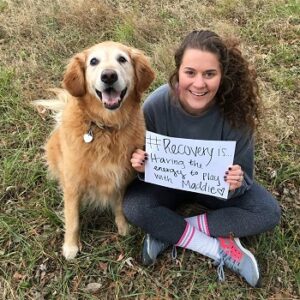Seven tips to help you navigate family gatherings this holiday season
Seven tips to help you navigate family gatherings this holiday season

by Emily Murray, sharing recovery experience
Eating disorder recovery can be daunting around the holiday season.
Halloween is centered around mini-chocolate candies and pumpkin-spice everything.
Thanksgiving is centered around food – and way too much of it for most of us.
Christmas is centered around cookies, cookies, and more cookies.
I enjoy all of these things. I really do. But I know how hard the internal battle is for someone struggling with an eating disorder during this time of year.
Some people have a hard time around the holidays because they are uncomfortable with the lack of control that comes with going to another person’s house for dinner and not knowing the nutritional content of each food. They “hear” their eating disorder’s chatter constantly throughout the night, dictating what they can or cannot eat.
On the flip-side, others have a hard time balancing their newfound freedom from their eating disorder (ED) without overdoing it and eating everything in sight.
The holidays may also be difficult for people who don’t have family support or have experienced loss during these times. This alone is anxiety-provoking, and makes it harder not to retreat to the behaviors that will help numb those feelings.
One of the most triggering things is when other people talk about their weight and diets during meal times:
“I’m going to start back on weight watchers Monday, but calories don’t count on the holidays!!”
“I feel like I have gained 10 lbs, someone stop me!”
“I’m going to be in a food coma for days!”
“Would you like anymore food? Eat more! You’re young! I can’t afford to eat dessert!”
“If only I was_______ or looked like ____________.”
“We’re all going to have to go on a juice cleanse after this dinner!”
“Why haven’t you tried my homemade stuffing, my pecan pie, or my rosemary garlic potatoes?”
“I’m not going to eat for 2 days.”
“Have you lost weight?” (whether it be to you or someone else in the room)
“You have a very healthy looking plate….”
As I type these words I feel my blood boiling. The reality is, the holidays are often a toxic environment for those who are going through recovery, and it shouldn’t be that way. We fight each day, over many months (and years), to practice good recovery and implement the strategies that we have learned from our treatment team. Recovery may be going well, or not so well. Regardless, the holiday season can be a bump in the road for many people going through recovery.
Here are seven tips to help ease your anxiety around the holiday season:
- Eat breakfast. Eating breakfast will set you up for success, especially on days like Thanksgiving. Regular meals will help regulate your blood sugar, so that you aren’t starving before the largest meal of the day, whenever that may be. When we come into meals having restricted food for a period of time, we have a tendency to eat more than we need. Eating breakfast or small snacks throughout the day will help you tap into those hunger and fullness cues with a little more ease. Fasting before Thanksgiving is never a good option, especially for someone in recovery.
- Establish healthy boundaries. It’s okay to say “no.” Saying “no” was hard for me to learn in the beginning of recovery because I like to people-please at times. If your grandma Susie can’t forgive you for not having an additional piece of her homemade pie, that’s her problem, not yours. Do what you need to do for you and your recovery. Follow your meal plan, but also allow for flexibility if you want to venture out and try something new. It’s also okay to say “yes” to a second cookie if that’s what your body genuinely wants.
- Walk away. There may be some conversations that are triggering or unhelpful to your recovery. It’s okay to excuse yourself and walk away. Join a different conversation, play with the kids in your family, pet the family dog, or go outside and get some fresh air. This will give you time to cool off and protect you from getting sucked into the negative talk.
- Embrace the unknown. One of the most terrifying things about the holidays is the lack of control that comes with them. Your schedule is often not as consistent as normal. You are exposed to many foods that you may have not allowed yourself to touch in years. You don’t know how much butter or sugar went into the sweet potato casserole, and that’s okay. It’s good for you, good for us. Let go of ED’s control, embrace the unknown, and savor the food that is nourishing your body.
- Identify your safe person. The holidays are filled with many “fear foods”: butter, sugar, fat, carbs, and more carbs (you get the picture). Some of these foods can induce very real anxiety when you are in recovery. It’s helpful to identify at least one person who understands this, who is safe and trustworthy, and knows that this day very well could be a difficult one for you. Sit close with them. Explore different foods with them. Ask them to hold you accountable. Voice your concerns to them throughout the day. Let them know how they can best help you in your recovery on that day.
- Show yourself grace. Even people who aren’t in recovery struggle with their diet during the holiday season. Most people overeat on Thanksgiving. It’s almost normal not to in our culture. But with someone who struggles with body image and an eating disorder, this can be even more difficult. Show yourself grace. Each day, you are doing the best you can. During the holidays, you will do the best you can. It gets easier each year to manage anxiety around mealtimes and eat intuitively. You will get there. But for the time in-between, show yourself the same grace and compassion that you would show someone else.
- Focus on what you’re thankful for . It’s really easy to forget everything that we have to be thankful for when we are so consumed by the not-so-great things in our lives. Life is hard, there’s no doubt about it. However, even on the darkest, most difficult days, we can find something to be thankful for in our hearts. Here are a few things that I am thankful for this holiday season:
- I am thankful for the ability to walk, talk, speak, and hear.
- I am thankful for where I am in recovery and how far I have come thus far.
- I am thankful for friends and family that support me and love me.
- I am thankful that my suffering has been used to encourage other people.
- I am thankful that I have access to food that nourishes my body and gives me life.
- I am thankful to be loved by a God that sent his own son to die for me.
Put your recovery first, embrace the unknown, face your fears, show yourself grace, focus on what you are thankful for, and enjoy the time you get to spend with loved ones.
About Emily: Emily is currently completing her supervised didactic program at Vanderbilt University. Upon completion of the program, her goal is to become a registered dietitian and further her career working with individuals who suffer from eating disorders. She hopes that sharing her story will inspire others to seek help, begin treatment, and fight for full recovery. She believes that writing is a platform that God has given her to be a voice for those who don’t have the strength to speak for themselves.
Emily’s website is: beautifullybroken.live and her email is: emuray4110@gmail.com





